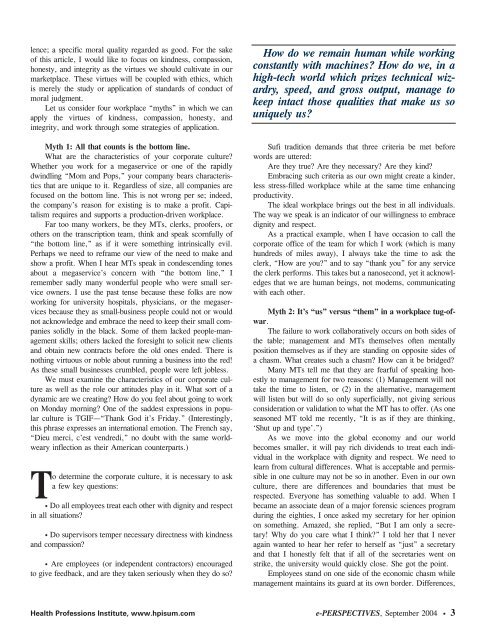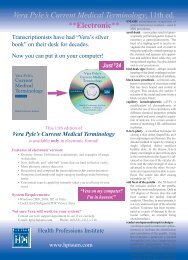on the Medical Transcription Profession - Health Professions Institute
on the Medical Transcription Profession - Health Professions Institute
on the Medical Transcription Profession - Health Professions Institute
Create successful ePaper yourself
Turn your PDF publications into a flip-book with our unique Google optimized e-Paper software.
lence; a specific moral quality regarded as good. For <strong>the</strong> sake<br />
of this article, I would like to focus <strong>on</strong> kindness, compassi<strong>on</strong>,<br />
h<strong>on</strong>esty, and integrity as <strong>the</strong> virtues we should cultivate in our<br />
marketplace. These virtues will be coupled with ethics, which<br />
is merely <strong>the</strong> study or applicati<strong>on</strong> of standards of c<strong>on</strong>duct of<br />
moral judgment.<br />
Let us c<strong>on</strong>sider four workplace “myths” in which we can<br />
apply <strong>the</strong> virtues of kindness, compassi<strong>on</strong>, h<strong>on</strong>esty, and<br />
integrity, and work through some strategies of applicati<strong>on</strong>.<br />
Myth 1: All that counts is <strong>the</strong> bottom line.<br />
What are <strong>the</strong> characteristics of your corporate culture?<br />
Whe<strong>the</strong>r you work for a megaservice or <strong>on</strong>e of <strong>the</strong> rapidly<br />
dwindling “Mom and Pops,” your company bears characteristics<br />
that are unique to it. Regardless of size, all companies are<br />
focused <strong>on</strong> <strong>the</strong> bottom line. This is not wr<strong>on</strong>g per se; indeed,<br />
<strong>the</strong> company’s reas<strong>on</strong> for existing is to make a profit. Capitalism<br />
requires and supports a producti<strong>on</strong>-driven workplace.<br />
Far too many workers, be <strong>the</strong>y MTs, clerks, proofers, or<br />
o<strong>the</strong>rs <strong>on</strong> <strong>the</strong> transcripti<strong>on</strong> team, think and speak scornfully of<br />
“<strong>the</strong> bottom line,” as if it were something intrinsically evil.<br />
Perhaps we need to reframe our view of <strong>the</strong> need to make and<br />
show a profit. When I hear MTs speak in c<strong>on</strong>descending t<strong>on</strong>es<br />
about a megaservice’s c<strong>on</strong>cern with “<strong>the</strong> bottom line,” I<br />
remember sadly many w<strong>on</strong>derful people who were small service<br />
owners. I use <strong>the</strong> past tense because <strong>the</strong>se folks are now<br />
working for university hospitals, physicians, or <strong>the</strong> megaservices<br />
because <strong>the</strong>y as small-business people could not or would<br />
not acknowledge and embrace <strong>the</strong> need to keep <strong>the</strong>ir small companies<br />
solidly in <strong>the</strong> black. Some of <strong>the</strong>m lacked people-management<br />
skills; o<strong>the</strong>rs lacked <strong>the</strong> foresight to solicit new clients<br />
and obtain new c<strong>on</strong>tracts before <strong>the</strong> old <strong>on</strong>es ended. There is<br />
nothing virtuous or noble about running a business into <strong>the</strong> red!<br />
As <strong>the</strong>se small businesses crumbled, people were left jobless.<br />
We must examine <strong>the</strong> characteristics of our corporate culture<br />
as well as <strong>the</strong> role our attitudes play in it. What sort of a<br />
dynamic are we creating? How do you feel about going to work<br />
<strong>on</strong> M<strong>on</strong>day morning? One of <strong>the</strong> saddest expressi<strong>on</strong>s in popular<br />
culture is TGIF—“Thank God it’s Friday.” (Interestingly,<br />
this phrase expresses an internati<strong>on</strong>al emoti<strong>on</strong>. The French say,<br />
“Dieu merci, c’est vendredi,” no doubt with <strong>the</strong> same worldweary<br />
inflecti<strong>on</strong> as <strong>the</strong>ir American counterparts.)<br />
To determine <strong>the</strong> corporate culture, it is necessary to ask<br />
a few key questi<strong>on</strong>s:<br />
• Do all employees treat each o<strong>the</strong>r with dignity and respect<br />
in all situati<strong>on</strong>s?<br />
• Do supervisors temper necessary directness with kindness<br />
and compassi<strong>on</strong>?<br />
• Are employees (or independent c<strong>on</strong>tractors) encouraged<br />
to give feedback, and are <strong>the</strong>y taken seriously when <strong>the</strong>y do so?<br />
How do we remain human while working<br />
c<strong>on</strong>stantly with machines? How do we, in a<br />
high-tech world which prizes technical wizardry,<br />
speed, and gross output, manage to<br />
keep intact those qualities that make us so<br />
uniquely us?<br />
Sufi traditi<strong>on</strong> demands that three criteria be met before<br />
words are uttered:<br />
Are <strong>the</strong>y true? Are <strong>the</strong>y necessary? Are <strong>the</strong>y kind?<br />
Embracing such criteria as our own might create a kinder,<br />
less stress-filled workplace while at <strong>the</strong> same time enhancing<br />
productivity.<br />
The ideal workplace brings out <strong>the</strong> best in all individuals.<br />
The way we speak is an indicator of our willingness to embrace<br />
dignity and respect.<br />
As a practical example, when I have occasi<strong>on</strong> to call <strong>the</strong><br />
corporate office of <strong>the</strong> team for which I work (which is many<br />
hundreds of miles away), I always take <strong>the</strong> time to ask <strong>the</strong><br />
clerk, “How are you?” and to say “thank you” for any service<br />
<strong>the</strong> clerk performs. This takes but a nanosec<strong>on</strong>d, yet it acknowledges<br />
that we are human beings, not modems, communicating<br />
with each o<strong>the</strong>r.<br />
Myth 2: It’s “us” versus “<strong>the</strong>m” in a workplace tug-ofwar.<br />
The failure to work collaboratively occurs <strong>on</strong> both sides of<br />
<strong>the</strong> table; management and MTs <strong>the</strong>mselves often mentally<br />
positi<strong>on</strong> <strong>the</strong>mselves as if <strong>the</strong>y are standing <strong>on</strong> opposite sides of<br />
a chasm. What creates such a chasm? How can it be bridged?<br />
Many MTs tell me that <strong>the</strong>y are fearful of speaking h<strong>on</strong>estly<br />
to management for two reas<strong>on</strong>s: (1) Management will not<br />
take <strong>the</strong> time to listen, or (2) in <strong>the</strong> alternative, management<br />
will listen but will do so <strong>on</strong>ly superficially, not giving serious<br />
c<strong>on</strong>siderati<strong>on</strong> or validati<strong>on</strong> to what <strong>the</strong> MT has to offer. (As <strong>on</strong>e<br />
seas<strong>on</strong>ed MT told me recently, “It is as if <strong>the</strong>y are thinking,<br />
‘Shut up and type’.”)<br />
As we move into <strong>the</strong> global ec<strong>on</strong>omy and our world<br />
becomes smaller, it will pay rich dividends to treat each individual<br />
in <strong>the</strong> workplace with dignity and respect. We need to<br />
learn from cultural differences. What is acceptable and permissible<br />
in <strong>on</strong>e culture may not be so in ano<strong>the</strong>r. Even in our own<br />
culture, <strong>the</strong>re are differences and boundaries that must be<br />
respected. Every<strong>on</strong>e has something valuable to add. When I<br />
became an associate dean of a major forensic sciences program<br />
during <strong>the</strong> eighties, I <strong>on</strong>ce asked my secretary for her opini<strong>on</strong><br />
<strong>on</strong> something. Amazed, she replied, “But I am <strong>on</strong>ly a secretary!<br />
Why do you care what I think?” I told her that I never<br />
again wanted to hear her refer to herself as “just” a secretary<br />
and that I h<strong>on</strong>estly felt that if all of <strong>the</strong> secretaries went <strong>on</strong><br />
strike, <strong>the</strong> university would quickly close. She got <strong>the</strong> point.<br />
Employees stand <strong>on</strong> <strong>on</strong>e side of <strong>the</strong> ec<strong>on</strong>omic chasm while<br />
management maintains its guard at its own border. Differences,<br />
<strong>Health</strong> Professi<strong>on</strong>s <strong>Institute</strong>, www.hpisum.com e-PERSPECTIVES, September 2004 • 3



